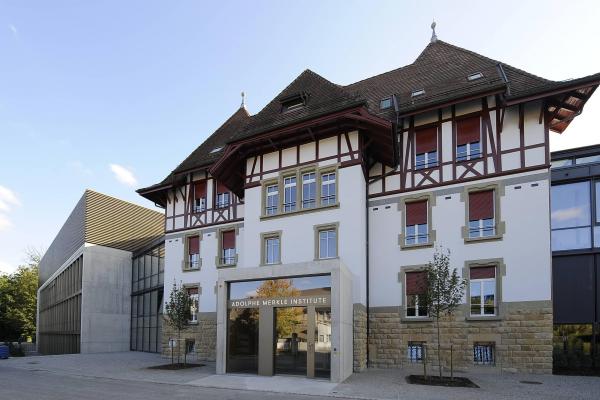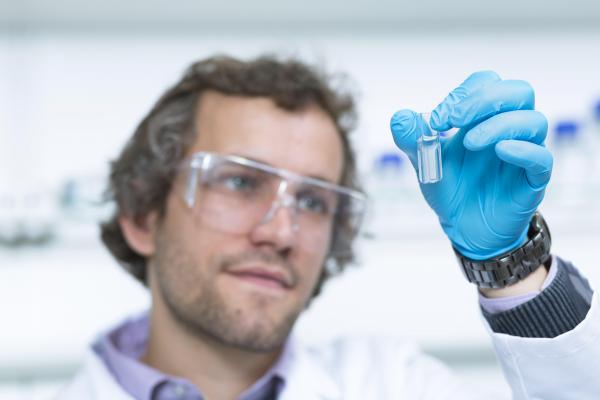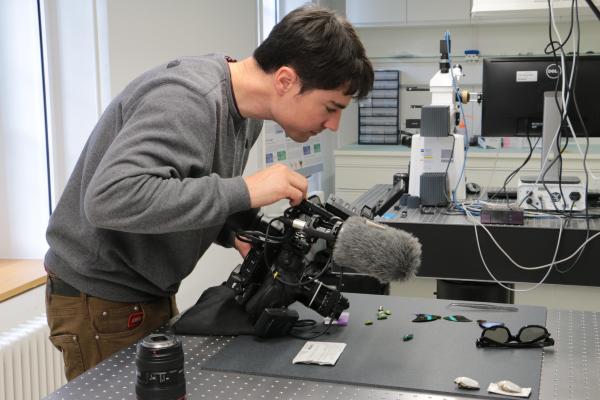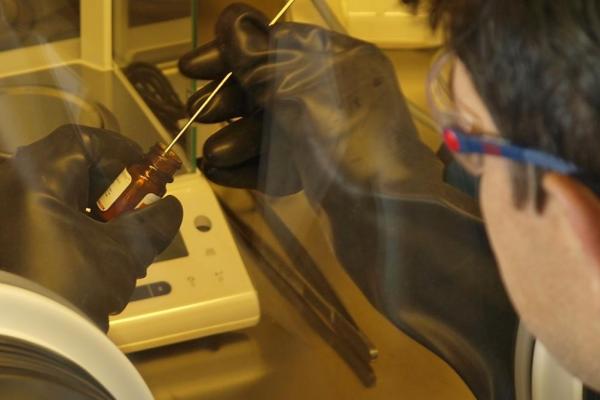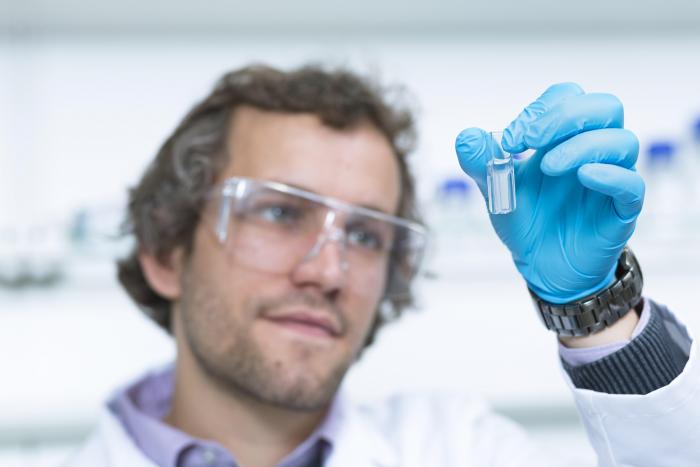
Specialized Master of Science in Chemistry and Physics of Soft Materials
Master
In Fribourg (Switzerland)
*Indicative price
Original amount in CHF:
CHF 3,220

The MSc in Chemistry and Physics of Soft Materials provides an excellent training for a career in technology or science. It's time to forward your career up the ladder!
-
Type
Master
-
Location
Fribourg (Switzerland)
-
Start date
Different dates available
Are you looking for a Master degree so you can specialize in the field of chemistry and physics of soft materials?
The Adolphe Merkle Institute (AMI) is an independent competence center at the University of Fribourg (Switzerland) that focuses on research and education in the domain of soft nanomaterials. Our research combines fundamental and application-oriented aspects in a multidisciplinary setting. Our scientists are currently organized in five research groups, which offer complementary expertise and interests in strategically important areas: BioNanomaterials, Macromolecular Chemistry, Polymer Chemistry and Materials, Soft Matter Physics, and Biophysics. Interdisciplinary collaborations between our researchers are the basis for the successful and efficient execution of complex research projects that transcend the boundaries of traditional scientific disciplines. This environment and our world-class research facilities make AMI a desirable destination for master’s students.
Click on Request Information in order to solve all your doubts related to the programme without obligation!
Facilities
Location
Start date
Start date
About this course
This MSc program managed by the Adolphe Merkle Institute (AMI) provides a unique interdisciplinary curriculum in the field of Soft Materials. The science of Soft Materials (aka “Soft Matter”) addresses substances that have aspects of solid and liquid materials at the same time. They encompass a wide range of materials that include polymers, fibre-reinforced composites and foams. The MSc programme therefore provides an excellent training for a career in technology or science. The combination of compulsory courses, electives and project work is designed to provide an interdisciplinary education in the chemistry, physics and biology of soft matter. The 2-year study programme will focus in particular on aspects of soft matter nanoscience, encompassing these three disciplines. Furthermore, the MScSoft gives admittance to doctoral studies. The programme requires 120 ECTS to complete, and can normally be completed within two years. The first semester consists of compulsory courses, and the practical basic laboratory skills course. The second and third semester consist of compulsory and elective courses and a short project each. The selection of elective courses, while maintaining the interdisciplinary nature of the curriculum, allow the student to acquire the knowledge required for the masters thesis. The first three semesters (75 ECTS) are designed to strengthen and complete the students existing knowledge of chemistry and physics as well as give them an introduction into biology of soft materials. The final part of the programme is dedicated to a research project of 45 ECTS in total, which includes the writing of a masters thesis and an oral presentation of the work. It is carried out in the 3rd and 4th semester and should normally be completed by the beginning of the following academic year. Some of the courses offered are taught jointly with other departments at the University of Fribourg and the University of Bern.
The program is aimed primarily at students from Chemistry, Physics, and from Biology, Materials Science, Engineering with a strong background in physics and chemistry.
To join the program, you should have an excellent background in chemistry and/or physics, and posess good oral and written English skills.
The student possesses a Bachelors degree in Physics or Chemistry.
• Candidates with a Bachelor from a different discipline in Science may be admitted subject to approval by the Committee of Student Requests.
• The student successfully passes an admission procedure consisting of a written application and an interview •
Satisfying the University admission requirements as defined in the Admission Regulations of the University of Fribourg.
The MSc students are closely integrated into the scientific environment of the institute. The MSc programme is very strongly “hands on”, with all practical components taught in real research laboratories on instruments that are used in the scientific projects at AMI. In-lab training begins from the start of the programme. The MSc program in Soft Materials provides either a solid base for an academic career, or excellent employment opportunities in a wide range of industries. The medical, pharmaceutical and food industries, for example, depend on an understanding of the soft matter properties of products they generate, as do chemical and automotive industries.
The admission procedure consists of three steps:
(1) Verify with the University of Fribourg whether your degree is accepted,
(2) Submit an application consisting of a CV and a motivation letter;
(3) Short listed candidates are invited for a Skype interview.
Reviews
Subjects
- Electrical
- Biophysics
- Materials
- Technology
- Engineering
- Polymer Chemistry
- GCSE Physics
- University
- Chemical analysis
- Chemistry Research
Course programme
Nanomaterials
The course will give a broad overview on nanomaterials, their synthesis, physicochemical properties, functionalisation, characterisation and application. The lectures will cover theoretical aspects just as well as practical approaches to these materials. A particular focus lies on magnetic and optical properties, top down and bottom up approaches will be introduced, and ethical concerns will be discussed in this course.
Fundamentals in Cell Biology
This course will teach the fundamentals in cell biology including cell structure and function. Regulation of genes, the structure and synthesis of proteins, how these molecules are integrated into cells, and how these cells are integrated into multicellular systems and organisms will be covered.
Microscopy
Aim of this lecture series is to give a broad overview into high-end microscopy including light and electron microscopy techniques.
Statistics and Experimental Design
The lectures cover basic probability (concepts of probability, important distributions) and statistics (parameter estimation, hypothesis testing, linear regression) with focus on biological applications and introduce all important concepts used in the courses in the following courses.
Scientific Writing
This course teaches the skills required to write and publish scientific articles.
Scattering Techniques
The scattering of light, electrons, x-rays and neutrons provides a non-destructive way to analysis the internal structure of materials. This course will provide the theoretical background and applications for of a range of scattering methods.
Basic Polymer Chemistry
This course will introduce the most important principles and concepts of polymer chemistry, provide an overview of reactions to synthesise polymers, discuss physical properties of polymers in solution and the solid state, and give a first overview of the properties of polymers.
Soft Condensed Matter Physics
This course discusses the physics of materials that combine aspects of liquids and solids. It encompasses the physical properties of polymers, colloids, gels, and soft materials in nature.
Biophysics
This course will teach the fundamental concepts of biophysics and discuss modern techniques to study cells and biological molecules. The practicals associated with this lecture will provide students with hands-on training in Fluorescence Recovery After Photobleaching (FRAP) experiments, in Fluorescence Correlation Spectroscopy (FCS), and in Electrophysiology for ion channel and nanopore recordings.
Functional Materials
Polymers with dynamic covalent bonds, Healable Polymers, Mechanochemistry in Polymers, Mechanically Adaptive Polymers, Shape Memory Materials. Electrically Conducting Polymers, Light-Emitting Polymers, Photovoltaic Polymers, other photovoltaic materials, nonlinear optical materials Synthesis, Physics, and Devices.
Biological Materials
The curse will cover the chemistry and material science of materials occurring in the living world, such as polysaccharides, proteins, nucleic acids, lignin, rubber, other naturally occurring polymers, composites and biominerals. Moreover, characterisation methods for biological materials will be introduced.
Innovation
This module will introduce the important steps on the way from a discovery in the lab to a product on the market. Students will learn to evaluate research results, secure intellectual property, evaluate its commercial value, and develop a business model. The students will also learn the difference in managing incremental vs. disruptive innovation and the differing approaches of innovation management in start-up companies vs. corporate technology enterprises.
Advanced Polymer Chemistry
Topics of this course include mechanistic and kinetic aspects of anionic and cationic polymerisation, olefin metathesis polymerisation, controlled radical polymerisation, ring opening polymerisation, and Ziegler Natta polymerisation. Additional topics that will be discussed include polymers from renewable sources, biopolymers, and reactions that permit post-polymerisation functionalisation.
Polymer Engineering
This class is an introduction to the engineering and technology of polymeric materials. Topics include: an introduction to the structure and properties of polymers in the solid state, structural organisation (i.e., crystallinity, liquid crystallinity, phase separation), thermal transitions, viscoelastic behaviour, rubber elasticity, mechanical properties, additives, blends and composites, polymer processing, and polymer recycling.
Physical Chemistry of Self-Assembly
The course will offer an overview on self-assembly of amphiphilic molecules (surfactants) as well of nanoparticles. The topic will be addresses from a physicochemical perspective, starting from the fundamental thermodynamic properties of surfaces.
Advanced Biomaterials
The chemistry and material science of hybrid materials comprising biological and synthetic building blocks will be taught. Moreover, the course will cover applications of biological materials as engineering materials, in nanotechnology and as biomaterials.
Applied Biomaterials
The course provides the basis for understanding material properties with respect to chemistry and atomic structure and specifically the ability to tailor chemistry and structure of materials. The different classes of materials, in particular metals, ceramics and polymers are introduced and discussed when appropriate, with state-of-the-art problems from medical technology to illustrate the structureproperty relationship in materials. Further, examples will be given to discuss the manipulation of these structure-property relationships in terms of the engineering of materials. Properties ranging from mechanical, thermal, electrical, and the interaction with cells and tissues will all be considered.
Soft Matter Modelling and Simulation Techniques
A range of different computer modelling approaches are routinely used to predict the structural, mechanical, electrical, optical, rheological, etc. properties of newly developed materials. Modelling can also help to interpret the results of complex measurement techniques. This course will introduce several modelling techniques that are routinely used in soft-matter science.
Materials for Energy Applications
The manufacture of solar cells, batteries, fuel-cells, etc. employs soft materials in many different ways. This course will discuss recent developments in the material development for energy applications and how soft-matter science can contribute to these.
Risk Assessment and Toxicology of Modern Materials
This course will describe and explain the basic principles of the emerging discipline of nanotoxicology. Multidisciplinary implementation of material science techniques based on in vitro and in vivo toxicological methods will be considered when assessing the risk of engineered nanomaterials for human health and the environment.
Biomembranes
This course focuses on the biochemistry and biophysics of transport and signalling processes through biomembranes as well as on the relevance of these processes for human disease. It discusses the molecular details of membranes, including:
- (1) Structure and composition of biomembranes;
- (2) Structures and properties of lipids;
- (3) Lateral and transverse asymmetry in membranes:
- (4) Model membranes;
- (5) Membrane dynamics and protein-lipid interactions;
- (6) Interaction of small molecules with membranes: partitioning, permeability, and electrical effects;
- (7) Methods for studying biomembranes;
- (8) Porins, ion channels, and transporter proteins;
- (9) Membrane enzymology;
- (10) Cell Surface: receptors, membrane recycling, and signal transduction.
Specialized Master of Science in Chemistry and Physics of Soft Materials
*Indicative price
Original amount in CHF:
CHF 3,220

